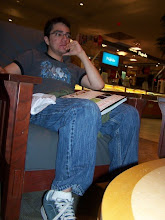 "Each breath I drew let into me new terror, joy, overpowering sweetness. I was pierced through and through with the arrows of it. I was being unmade."
"Each breath I drew let into me new terror, joy, overpowering sweetness. I was pierced through and through with the arrows of it. I was being unmade."I first became aware of C.S. Lewis in fourth grade in Mrs. Hendershot's class when we read The Lion, the Witch, and the Wardrobe. After that, Narnia became a big part of my life. That class was when I first began to identify myself as a writer.
I read Till We Have Faces a few years ago, and out of all of the works of Lewis' I've read (The Chronicles of Narnia, The Space Trilogy), this is one of my favorites and, I think, his best work.
Till We Have Faces tells the story of Cupid and Psyche from the perspective of Psyche's older sister Orual. Orual presents her case against the gods who have, in her eyes, taken away the only person she has ever loved. The story is split into two parts, the first Orual's case against the gods, and the second their response.
When I read this book the first time, I couldn't put it down. Orual's voice sucks you into the story, and the changes C.S. Lewis makes to the myth are brilliant. Everything was great until I got to the second half of the book, and Orual faces the gods.
See, I had read reviews of the book online, which praised Lewis for the way the title of the novel surfaces in the story, and the revelation the book makes. When I got to that part, I thought it was clever, but I wasn't impacted by it. It wasn't until a few weeks later, when I was in a Bible study, and explained the meaning of the title, that it finally hit me. As I spoke, I realized exactly what the second half of the book was saying, and was blown away. I had to explain it in order to understand it.
I reread this book because I am working on my Eros script, and it's definitely given me ideas for the script. Rereading it I caught a lot of tiny hints and nuances I missed the first time, and it made the conclusion a lot stronger. Till We Have Faces is filled with wisdom, witty metaphors and language, and love.
Orual says that when writing this story, she was with story as with child. I feel that C.S. Lewis is probably speaking about himself in that statement. This book feels like a child, beautiful and newborn and lovable.
Till We Have Faces was dedicated to C.S. Lewis' wife Joy Davidman.

